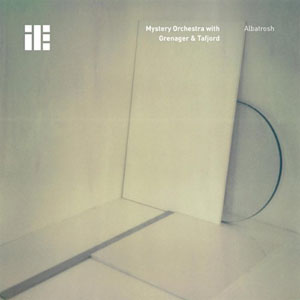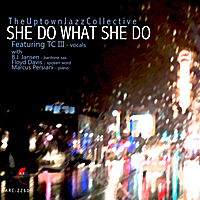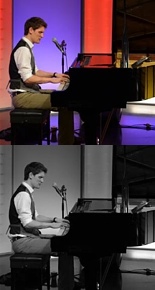Home » Jazz Articles » JazzLife UK » It's Been A Very Good Year
It's Been A Very Good Year
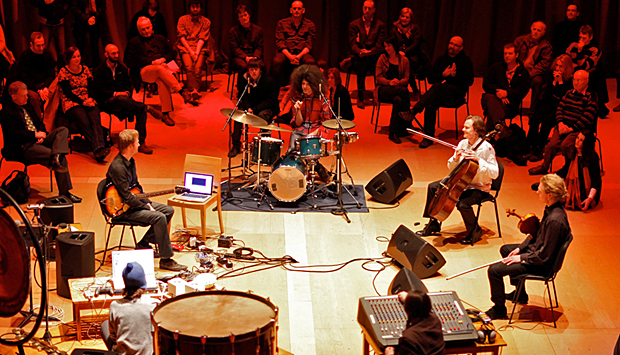
But first: what's been going right with the British jazz scene? Well, Faster Than Sound and Saxophone Massive, for a start. Some fantastic new releases that promise a vintage year for home-produced jazz music. And a lineup of top quality jazz stars that might just turn the lovely mediaeval town of Norwich into an international jazz epicentre for the month of May. We have that great Victorian engineer Isambard Kingdom Brunel to thank for part of that, of course.
It's Been A Very Good Year: so far
Maybe my spectacles are more than usually rose-tinted these days, but 2011 looks like it might be A Good Year For British Jazz. There are signs, just a few, that things are happening, suggestions that good times are just around the corner—the first green shoots of recovery, as a Government Spokesman might put it, if there was a Government Spokesman for Jazz. Of course, I might be wrong, but with that cheery optimism for which we Brits are universally loved, I shall assume that I'm right. Why? Well ...
 Late '10 and early '11 have seen a crop of outstanding new albums from UK-based acts. The Kit Downes Trio's Quiet Tiger (Basho Records, 2011), Led Bib's Bring Your Own (Cuneiform Records, 2011), Gwilym Simcock's Good Days At Schloss Elmau (ACT Music), Trish Clowes' (pictured left) Tangent (Basho Records, 2010) and Debbie Winter's self-produced 2011 debut, Red Song, are all superb recordings—and there seem to be plenty of others on the way. What's more, these are all young (and young-ish) musicians, who are still developing, and there's more to come.
Late '10 and early '11 have seen a crop of outstanding new albums from UK-based acts. The Kit Downes Trio's Quiet Tiger (Basho Records, 2011), Led Bib's Bring Your Own (Cuneiform Records, 2011), Gwilym Simcock's Good Days At Schloss Elmau (ACT Music), Trish Clowes' (pictured left) Tangent (Basho Records, 2010) and Debbie Winter's self-produced 2011 debut, Red Song, are all superb recordings—and there seem to be plenty of others on the way. What's more, these are all young (and young-ish) musicians, who are still developing, and there's more to come. There's great variety in the music too. Even within my brief list there's solo piano from Simcock, richly romantic vocals from Winter and ambitious orchestral work from Clowes. There's more to follow, too. Northern Ireland's John Leighton will be releasing his debut CD, combining those two stalwarts of jazz, Florence Nightingale and John Keats, in one brief but stunning package. Anglo-Italian post bop saxophonist Tommaso Starace also has a new album on the way, with some of the most blisteringly exciting alto saxophone playing on either side of the Atlantic. All this, before the Easter holiday.
Such a crop of great albums bodes well for this year's Parliamentary Jazz Awards. The 2011 awards—probably the preeminent jazz awards in the UK—will be presented in the Houses of Parliament on May 17, with broadcaster Paul Gambaccini again acting as host. The awards not only recognize musicians, but also educators, venues and others whose commitment to jazz is central to its continued success as an art form. My apologies must go to those artists, venues and writers I have voted for—my total lack of success in predicting any previous winners means that their chances have already gone. Sorry, folks.
The programs for Norwich's two major jazz events have been announced. Both take place in May, and the next few weeks will be filled with anticipation of some great music. First up is the Norwich Jazz Party, held across the first weekend in May and featuring some of the finest mainstream jazz players in the world. Bob Wilber, Ken Peplowski, and the amazingly versatile Ken Peplowski are all promised for 2011.
The Norfolk and Norwich Festival is an artistic and cultural treat, and its jazz program for 2011 may well be its strongest ever. The Festival was established in 1772, as an annual concert and service in support of the new city hospital (which makes it older than jazz and the USA). Jazz is a relative newcomer to the Festival program, but the jazz strand is innovative and strong: the 2011 lineup includes Gretchen Parlato, Charlie Haden, Kyle Eastwood and Jan Garbarek. The Haden gig sounds especially fine, taking place as it will in the lovely setting of St Peter Mancroft church which played host to a fantastic Tomasz Stańko concert a couple of years ago.
Saxophones Faster Than Sound
Another positive aspect of the UK jazz scene is the willingness of so many of its musicians to get involved in community-based projects, arts collaborations and performance events. Two such projects came to my attention in February: Andy Sheppard's Saxophone Massive, and Rhythm Of Strings at Snape Maltings in Suffolk.
Rhythm Of Strings was the first to catch my eye, and ear, as part of the Faster Than Sound initiative. The initiative is hosted by Aldeburgh Music at its beautiful home venue in rural Suffolk, and aims to bring together diverse groups of artists for short residencies, each of which culminates in a performance. The Rhythm Of Strings collaboration was led by Sebastian Rochford, one of the finest drummers around. Leafcutter John—like Rochford, a member of Polar Bear—guitarist Leo Abrahams, violist Max Baillie and cellist Oliver Coates all joined Rochford for the week-long project.
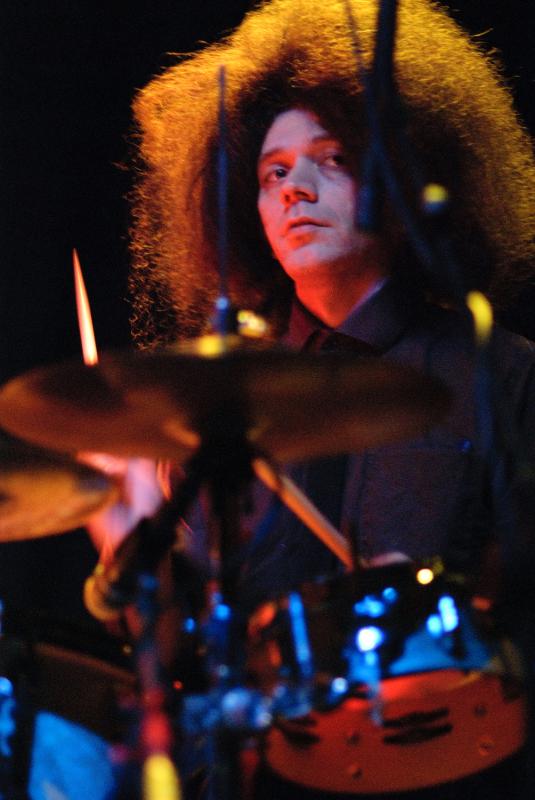 In the pre-performance talk, Rochford (pictured right) revealed that he had written around 14 pieces in advance of the residency, but had abandoned all of them in favor of new music written the day before the start of the collaboration. The music developed over the week, changing with each rehearsal and, ultimately, in the performance itself. And what a thing of beauty it was. The musicians positioned themselves in the center of the hall, with the audience around them on all sides. Rochford invited the audience to move around as the concert progress in order to hear the music from different angles, with varying instrumental emphases. It was an excellent suggestion, the sound varying to a remarkable degree across the hall. Sadly, most of the audience failed to act on Rochford's suggestion, preferring to remain in one place for the entire performance, and so they missed out on the full sonic experience.
In the pre-performance talk, Rochford (pictured right) revealed that he had written around 14 pieces in advance of the residency, but had abandoned all of them in favor of new music written the day before the start of the collaboration. The music developed over the week, changing with each rehearsal and, ultimately, in the performance itself. And what a thing of beauty it was. The musicians positioned themselves in the center of the hall, with the audience around them on all sides. Rochford invited the audience to move around as the concert progress in order to hear the music from different angles, with varying instrumental emphases. It was an excellent suggestion, the sound varying to a remarkable degree across the hall. Sadly, most of the audience failed to act on Rochford's suggestion, preferring to remain in one place for the entire performance, and so they missed out on the full sonic experience. The musicians were superb; Coates, in particular, creating some wonderfully expressive sounds. The always-inventive Leafcutter John mixed electronics with acoustic instruments, recordings of the other musicians, and his own voice. At one point he laid the microphone in his lap and took a drink of water: I waited expectantly for the result to appear across the speakers, but apparently he was just thirsty.
The next Faster Than Sound collaboration will apparently be a 24-hour outdoor sound installation. This is not a project that is content to tread the well-worn paths, and more power to it.
Another of Rochford's 2011 collaborations will be with saxophonist/ECM recording artist Sheppard, who just happens to be the man in charge of the Saxophone Massive.
Saxophone Massive is a wonderfully simple idea. First, gather together 200 saxophone players of varying levels of experience and ability: rehearse for a few weeks: perform in the open air. Well, maybe not that simple. But it must be fun, because Sheppard has already led the Massive in Bristol, London and Leeds in the UK, Coutances in France, and Stavanger in Norway.
The first Saxophone Massive performed in Bristol, in the west of England, in 2006 on the occasion of the 200th anniversary of the birth of Isambard Kingdom Brunel. As Sheppard explained, "There was a whole series of celebrations. They invited me in just to see if I had any ideas. I asked how old he'd have been, they said '200,' so I said 'OK, I'll write for 200 saxophones.'" Sheppard recorded sounds from the nearby Clifton Suspension Bridge, designed by Brunel, to incorporate those sounds into the music he was writing. "I tuned it to Bb, and that's how the piece began," says the composer.
"It's a celebratory piece of music" Sheppard continues, "I wouldn't necessarily call it jazz, but it's a community experience and, by the end of the performance, everyone is on a massive high." The piece, called "Living Bridge," remains fundamentally the same for each performance but is, in Sheppard's words, "tailored to the location." In Norwich's case, the performance will take place at the Forum, outside the city's Millennium Library.
Saxophone Massive is wonderfully inclusive. There's no age limit, no minimum level of experience or expertise—Sheppard writes parts for those who have just started to play, and for those who can't read music, as well as for the talented sight-reader. The job of coordinating 200 Norwich saxophonists falls to percussionist Orphy Robinson, a friendly and humorous man, who gives the distinct impression of enjoying every second of the job.

Saxophone Massive: first rehearsal. Left, Andy Sheppard; right, Orphy Robinson
The Saxophone Massive will perform on the first day of the Norfolk and Norwich Festival on May 6th. The massed ranks of saxophones will play music by Sheppard in what will, hopefully, be early evening sunshine. The first rehearsal was notable for the enthusiasm of the musicians: the youngest was probably around seven or eight years of age, the oldest closer to 78, all of them brought together to play music. Robinson and Sheppard will surely keep this enthusiasm in full swing for the performance itself, and it should prove to be a memorable Festival opener.
A Close Shave
Spring is (nearly) here, and while my heart should perhaps start to go dancing, a combination of bad weather, workplace pressures, personal laziness and an emerging ennui which, at times, threatens to take on epic proportions, meant that as February turned into March I had yet to attend my first gig of 2011.
My absence from British jazz music's live venues has no doubt gone unnoticed by musicians, promoters and fans alike—it will certainly make little difference to the circuit's economic status—but it certainly made a difference to me ... I didn't miss the live experience at all.
I didn't miss the overpriced, inconvenient parking facilities. I didn't miss the overpriced, underkept, beer. I didn't miss the discomfort, the glowering audience members, the frisson of anticipatory excitement: "This is gonna be great," or the sudden despair of realization, "No, it isn't."
I didn't miss them to such an extent that I started forgetting what I did miss: the meetings with old acquaintances, the introductions to new ones, the occasional triumph of the British beer-keeper's art, and the times—the many times—when the frisson of excitement is fully justified, when the music is worth it, when something great or even magical happens and I'm there to hear it.
Rhythm Of Strings brought me back to my senses. Just in time. A close shave, indeed.
What's Wrong With The British Jazz Scene This Month?
No doubt, as the year progresses this section of JazzLife UK will find plenty to keep it occupied. But for this time, I'll close in the same spirit of cheery British optimism which opened the column.
This month, there's nothing wrong with the British jazz scene.
Photo Credit
Top Photo: Jana Chiellino
All Other Photos: Bruce Lindsay
Tags
JazzLife UK
Bruce Lindsay
United Kingdom
Esperanza Spalding
Kit Downes
Led Bib
Gwilym Simcock
Trish Clowes
Debbie Winter
Tommaso Starace
Bob Wilber
Ken Peplowski
Scott Robinson
Gretchen Parlato
Charlie Haden
Kyle Eastwood
Jan Garbarek
tomasz stanko
andy sheppard
Sebastian Rochford
Polar Bear
Orphy Robinson
PREVIOUS / NEXT
Support All About Jazz
 All About Jazz has been a pillar of jazz since 1995, championing it as an art form and, more importantly, supporting the musicians who make it. Our enduring commitment has made "AAJ" one of the most culturally important websites of its kind, read by hundreds of thousands of fans, musicians and industry figures every month.
All About Jazz has been a pillar of jazz since 1995, championing it as an art form and, more importantly, supporting the musicians who make it. Our enduring commitment has made "AAJ" one of the most culturally important websites of its kind, read by hundreds of thousands of fans, musicians and industry figures every month.


